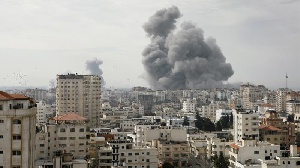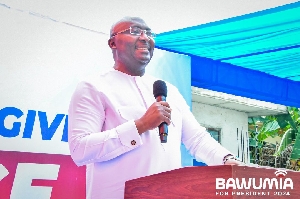Opinions of Sunday, 26 August 2007
Columnist: Ofosu-Appiah, Ben
The Best Democracy That Money Can Buy
I have often wondered aloud these days: Do election results now reflect what voters really want or does money ultimately influences the outcome?
It is amazing the way money is being spent by the almost two dozen NPP presidential aspirants who want to win the party’s presidential nomination. It makes you think if the nomination is up for sale to the highest bidder. The party’s National Executive Committee is not helping matters by keeping a blind eye to the blatant display of wealth and bribery of potential delegates that is going on. The Party Chairman speaking at a Training workshop for constituency executives of the party in Tamale rather encouraged potential delegates to collect bribes from the aspirants, indirectly encouraging presidential aspirants to pay bribes. It is like “if you want their votes, then you must be prepared to pay for it”. I was honestly dismayed with Mr. Mac Manu’s remark. I thought he would condemn the practice where presidential aspirants are paying huge sums of money to influence the party’s selection of its presidential candidate and will call all aspirants to order. On the contrary, his comments suggests to me that he is rather encouraging and promoting such unhealthy practice.
Where is our ethics law on political donations, or soliciting for funds from foreign interests, or vote buying. Do we have any laws in our statute books that ban these. Aren’t there any laws that require delegates to report all gifts and bar them from accepting any gifts above a certain value? This brings into mind the case of the renovation of the President’s private residence way back in 2001 which was supposedly given as a gift. If our national leaders unashamedly accept gifts of that magnitude how about a poor delegate from say Asuogyaman constituency?
The other day it was the NDC that was reported to have raised $700,000 in the US in a function that was reportedly attended by more Nigerians than Ghanaians. If there are no laws that banned foreigners from making political donations to our political parties, we may one day mortgage our destiny as a nation to foreign interests and posterity will never forgive us.
By the way, why can’t the NPP coalesce around say about half dozen candidates for the party’s presidential primaries? The current twenty-two or so candidates do not bode well for the party. Some say it is a reflection of the party’s internal democracy but any close watcher of the political scene knows that even the die hard democrats are not comfortable with the number of aspirants.
Political campaigning has obviously become very expensive and the party or the candidate that wins is the one with the most clever sales campaign and a lot of money to spend. Politics has adopted all the tools of modern merchandising ---- advertising, polling, telemarketing, demographic targeting, door to door campaigns etc, etc. Politicians put together campaigns teams, and they must hire technocrats and strategists and spin doctors who craft soundbites, study polling data, put together adverts targeting specific demographic groups, and also do damage control, and all these require money and lots of it.
Of course the throwing of money around poses profound questions about politics and democracy. As politics became dominated with money people treated it that way, and cynicism increased. Voters became more dismissive of political rhetoric and ignored empty political promises. Election results began to reflect more and more on the outcome of who spent what, when and where rather than on the issues that matter to the people. The larger question involves democracy. The money needed to run modern campaigns has had a corrupting influence on politics and on our democracy. We need to reform and fix the system. We must raise the ethics bar to a whole new level to bring sanity into the system.
Tokyo-Japan.
The writer is a social and political analyst and policy strategist based in Tokyo, Japan. He has written extensively on social, political and economic issues in Africa and the Third World. He welcomes your comments.

Views expressed by the author(s) do not necessarily reflect those of GhanaHomePage.












